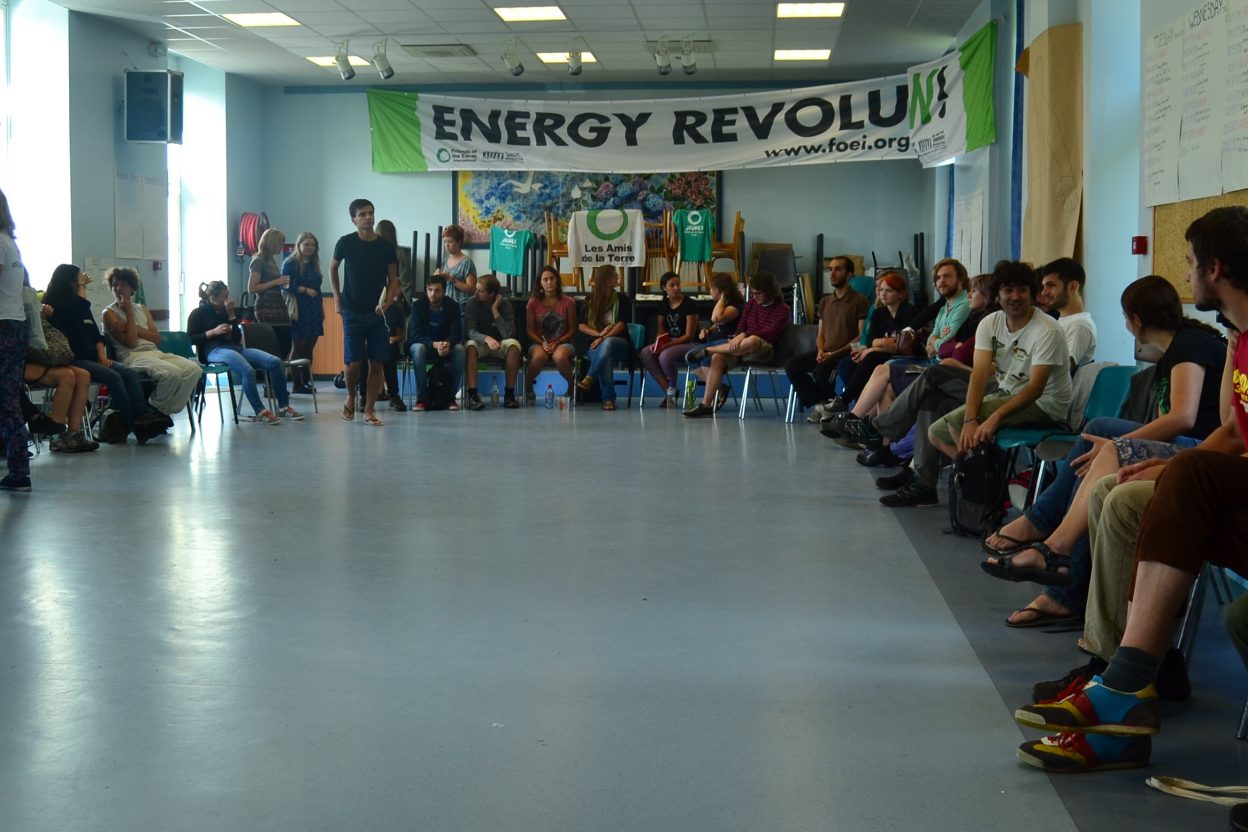Young Friends of the Earth Europe’s annual summer camp is in north-west France this year, mobilising 100 youth from around Europe in the run-up to the UN climate talks in Paris this December (COP21). On day 1, Dora from Croatia and Mélody from France reflects on what’s happened so far…
Dora from Croatia:
The basic statistics: around 100 people from 29 countries, gathered in the beautiful French province of Brittany for 6 days with one goal. Or three, actually, that could be summed up by the Friends of the Earth International slogan ‘mobilise, resist, transform.’ The first official day of our Young Friends of the Earth summer camp 2015, after a few technical details and introductions, started with a concept that seems basic (nonetheless extremely complex) to the work we do and the goal we all wish to achieve – a system change. Three amazing woman, Dipti and Majandra at Friends of the Earth International and Susi working for Friends of the Earth Europe opened up the topics and with their presentations engaged us into a critical debate.
Although we did start with the ‘all and mighty COP21’, we immediately agreed that this particular event isn’t reflecting the bigger picture at all. Of course that cutting the CO2 emissions and demanding for transition to renewable sources of energy is absolutely necessary, but it only scratches the surface of the global crisis that we are experiencing. The COP alone, being often captured by the ‘big players’ and their interests, does little to address the climate and social crimes on the global South, shutting down the voices of the communities. In short, the conclusion was that the climate talks aren’t providing the climate justice and that here is where we, the people, step in. At the end, most important part of COP is what happens beyond the COP.
As our debates evolved we stressed out that this system, that is generating inequality and exploitation of the resources and, literally, each other, has to be transformed. A tale as old as time? Maybe, but it has to be said and the key factors (the how, when, why, and who) have to be questioned. We agreed that the key is to see our local narratives as a part of a global struggle, to connect it and form a bigger picture. In light of that, to be consistent, we met the locals that 30 years ago formed a part of the resistance against a nuclear power plant and are still active on local and national levels. This helped us to get to know the French context and possibly learn from it.
The discussions got so heated that we were almost instantly late with the program because of all the questions and solutions being raised. Gabriel, a member of the French organizing team, had to interrupt twice and desperately try to get us to follow the program. Of course, the discussions were continued during the breaks. To end this on an empowering note, which for me is the general sensation of this entire event, I’ll quote and support the French Friends of the Earth Europe and Young Friends of the Earth Europe when they say that ‘we are the climate generation’ – ‘nous sommes la generation climat’. For more on that and the French context tomorrow, so stay tuned.
Mélody from France was also on hand to give her impression of the day’s events:
Beuzec-Cap-Sizun. July. You must think “Where is it? Are you sure you will make a summercamp there?”
It is in Brittany, France, and yes, it is the best place for a summercamp for environmental activists. The place is quiet, fortunately we have already beautiful weather and the communities around here have a rich history of social and environmental activism. Guest speakers – local activists and experts in social and environmental justice from abroad taught us that ecology is nowadays linked to social and economic problems. Everything is linked, everything has an impact on everything else.
They showed us that mainstream political forces can be strong and overpower human rights and local democracy, but that people in the region and have to be stronger and have to continue to fight. Because if human rights are to exist, we need to make sure we have democracy and true solidarity with each other.
The day ended with a movie about Plogoff – a local town which successfully mobilised to block a new nuclear power plant in the 1970s. A good example for solidarity and social cohesion. But from the footage, it looked like a civil war between the people and the police, between the Plogoff inhabitants and the government. This sort of conflict should not happen anymore, because we are human, and we ought to be able to understand and address each other’s concerns without violence and with the same rights for all.

